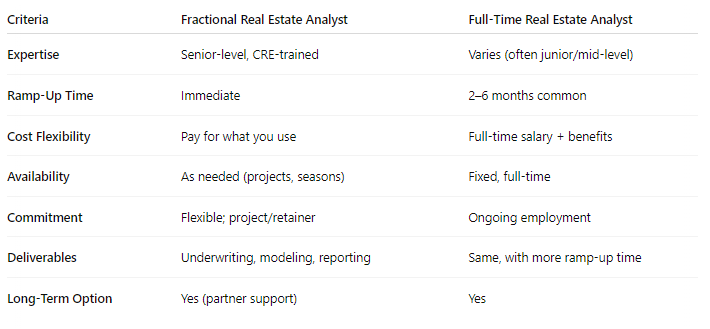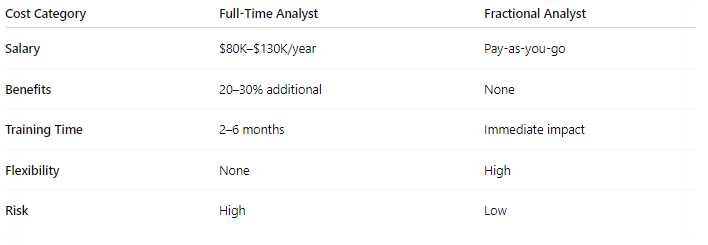Fractional vs. Full-Time Analyst in Commercial Real Estate: Which Is Right for You?
In the high-stakes world of commercial real estate (CRE) investing, the difference between a good deal and a bad one often comes down to the quality of your analysis. Whether you're underwriting a new acquisition, preparing quarterly reports for investors, or planning a fund disposition, having the right analytical support is crucial.
Traditionally, firms have leaned on full-time analysts for these needs. But today, many sophisticated operators are embracing a new model—one that brings senior-level real estate expertise, rapid deployment, and scalable support without the cost or commitment of a full-time hire.
That model is the Fractional Real Estate Analyst.
At The Fractional Analyst, we specialize in delivering world-class analytical firepower tailored specifically for the CRE industry. If you’re evaluating whether to hire full-time or fractional, this guide will help you make the right decision—and show you how a fractional solution might be exactly what your firm needs to grow smarter, faster, and more profitably.
What Is a Full-Time Real Estate Analyst?
A full-time real estate analyst is a salaried team member focused on supporting acquisitions, asset management, fundraising, and reporting initiatives. Their work is critical to sourcing, underwriting, and managing real estate investments.
Typical responsibilities include:
Creating detailed acquisition pro formas
Building and maintaining cash flow models
Supporting financing efforts (loan packages, lender reporting)
Assisting with quarterly and annual investor communications
Conducting property- and market-level research
Tracking operating performance against pro forma assumptions
Full-time analysts become deeply embedded in your team and internal systems over time.
What Is a Fractional Real Estate Analyst?
A Fractional Real Estate Analyst offers the same skills, capabilities, and strategic insight as a full-time analyst—only with greater flexibility and lower overhead.
The big advantage? We already know real estate inside and out.
There’s no steep learning curve. No handholding. No risk of hiring someone who doesn’t "get" the nuances of CRE.
At The Fractional Analyst, we bring years of direct experience working across asset types—from multifamily, mobile home parks, and senior living to mixed-use developments and specialty projects like wedding venues.
We provide plug-and-play support that can scale with your firm’s growth, seasonality, and deal flow.
And when your needs change?
You can scale us up or down—without the headaches of hiring, training, or laying off full-time staff.
Core Differences: Fractional vs. Full-Time CRE Analyst
Why Fractional Analysts Are Perfect for CRE Operators
📈 Expertise Across Asset Classes
Real estate is not one-size-fits-all. Each asset class requires a different lens—and fractional analysts with the right experience can adjust to the nuances instantly.
Let’s break it down:
Senior Living
Complex Operating Metrics: Occupancy rates, average revenue per occupied room (RevPOR), operating margins.
Stakeholder Reporting: Institutional investors, lenders, partners require frequent and detailed reporting.
Case Study:
We work with a senior living operator with over $1 billion in AUM moving through a fund disposition process.
Our role: Monthly and quarterly reporting for key stakeholders including lenders, equity investors, and outside auditors.
We've been trusted partners for over a year, adapting to evolving reporting needs as the fund moves toward liquidation.
Mobile Home Parks
Value-Add Potential: Rent raises, utility bill-backs, cap-ex improvements can dramatically improve value.
Exit Analysis: Knowing when to sell vs. hold is critical.
Case Study:
We supported a mobile home park operator managing $10M AUM, helping them model scenarios around holding vs. selling their assets to reallocate capital into higher-yielding investments.
Specialty Use Properties (Wedding Venues)
Irregular Cash Flows: Seasonality, event deposits, and maintenance cap-ex must be modeled carefully.
Bank Presentation: Lenders need standardized financial statements and projections.
Case Study:
We partnered with a wedding venue developer to build a detailed pro forma and standardize financials for bank submission—paving the way for their financing approval.
Multifamily & Market Expansion
Rent Growth Projections: Critical to acquisition modeling.
Market Research: Understanding submarkets is vital.
Case Study:
An individual investor exploring a new geographic market partnered with us for in-depth market research, including rent comps, supply pipeline analysis, and employment drivers.
Fund Management
Fund-Level Forecasting: IRR, equity multiples, cash flow waterfalls.
Investor Communication: Cohesive reporting to LPs and GPs.
Case Study:
A CRE fund operator needed a comprehensive fund model.
We built a dynamic model enabling them to track commitments, calls, distributions, and returns—crucial for both operational management and investor reporting.
Deliverables You Can Expect from a Fractional CRE Analyst
Acquisition Underwriting Models (with dynamic rent rolls, OpEx assumptions, renovation schedules)
Investment Memos for ICs and lenders
Operating Projections for stabilized and value-add properties
Fund and Portfolio-Level Dashboards
Sensitivity Analysis (rent growth, cap rates, interest rates)
Quarterly/Annual Investor Reporting
Asset Management Support (budget vs. actual variance analysis)
Debt Sizing Models for refinance scenarios
Market Research (rent comps, employment trends, absorption rates)
Disposition Analysis (IRR/EM at sale scenarios)
Why CRE Firms Are Choosing Fractional Analysts Over Full-Time Hires
✅ Immediate Real Estate-Specific Impact
No training. No guessing. No learning curve.
You get a CRE-fluent expert building models, generating insights, and supporting your deals immediately.
✅ Flexible Support for Growing Firms
If your pipeline grows or shrinks, you adjust your fractional support without taking on permanent payroll obligations.
✅ Senior-Level Expertise Without Senior-Level Costs
Hiring a VP of Finance or Director of Investments costs $150K+ plus bonuses and benefits.
With a fractional model, you tap into that same level of expertise at a fraction of the cost—only when you need it.
✅ Risk Reduction
No bad hires. No costly severances. No cultural mismatches.
If your needs change, we adapt.
When a Full-Time Analyst Might Still Make Sense
Full-time analysts remain a great fit if:
You have daily, heavy analysis needs across acquisitions, asset management, and dispositions.
You’re ready to build an internal finance/investments team for the long haul.
You want dedicated headcount managing internal processes full-time.
(And even in these cases, many clients still start with fractional support during the search and onboarding periods.)
Cost Comparison: Full-Time vs. Fractional Analyst
Conclusion: Choose the Model That Grows with You
In today’s commercial real estate landscape, agility, insight, and cost control are critical.
Fractional analysts with real estate expertise offer firms a better, faster, smarter way to manage analysis without being locked into long-term overhead.
At The Fractional Analyst, we don’t just understand Excel models—we understand real estate operations, capital markets, development pipelines, and investor expectations.
We become your strategic partner, whether for a fund lifecycle, an acquisition spree, a refinance push, or your next big market move.
You can work with us for a quarter—or a decade.
You can turn us on and off based on your pipeline.
You can grow smarter, stay leaner, and move faster.
Ready to strengthen your CRE analytics bench?
We’re ready when you are.

